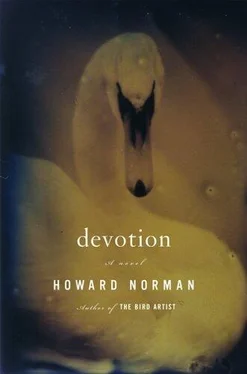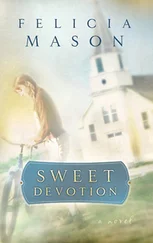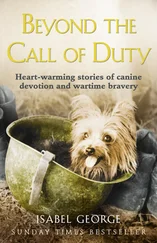“Father-in-law,” William said.
“Your son-in-law here’s asking for an anodyne.”
David didn’t know what the word meant, but William said, “Who doesn’t need that, eh?”
“There’s all sorts, of course,” nurse Fournier said. “I get mine from church. But Mr. Kozol needs one through the drip. I’ve been a nurse half my life. I can read his expression.”
She studied the chart on a clipboard tied with string to the bed frame. She fluffed up David’s pillows, gently inspected his mouth and jaw, refilled the plastic water cup on the adjustable tray, replaced the straw. “Be brave, Mr. Kozol,” she said. “You have an hour’s wait. It’s a good hospital that keeps track of such things.”
When the nurse left, David looked at William, and only then did he notice that William was somewhat formally dressed, herringbone sports jacket, corduroy trousers, dark shirt and tie, clothes far too heavy for summer, especially this one. David took up a pad of paper and wrote on it, tore off the sheet and handed it to William: Can you sneak a whiskey in here for me?
“Oh, I don’t think that particular anodyne’s allowed.”
David closed his eyes.
“The estate’s back in good hands now,” William said. “Don’t fret over the swans, for example. Don’t concern yourself one bit.”
David mumbled something incoherently.
“Hard to understand you,” William said. “I know what that’s like, don’t I, having to speak through all that pain and pills. I’m scarcely just past it myself.”
David — for the first time — said, “I’m sorry.”
“By the way, feel free to stay on in the guest cottage. I’ve spoken with Izzy and Stefania. I’ll nurse you back to health. The doctor will no doubt recommend soups. I’m an expert at soups, don’t know if Maggie mentioned. I made soup for her every winter day, elementary school.” William pulled up a chair and sat. “I’ve got an idea. What if tomorrow I bring in the photograph albums from Maggie’s upbringing? Janice was absolutely devoted to those albums, my lord. I keep them in a fireproof safe. Anyway, it might be a useful education. You might get to know better who you’re married to.”
“I’ll provide the commentary,” William said at ten the next morning. He’d brought three photograph albums. He was dressed in exactly the same clothes as the day before, no tie this time. He set the albums on the bed. He took off his sports jacket and put it on the back of the chair, which he pulled close to the bed. He opened the first album across David’s lap. “This one takes Margaret up to age twelve.”
David wanted to say, “I’m going to take a lot of photographs of our daughter,” but held back. First, it was difficult for him to speak at all, though he could’ve written it out. Also, it wasn’t the right time to reveal that he knew Maggie was to give birth in November. William was keeping the news to himself; he’d brought the albums to bring David up to speed on Maggie’s childhood — things should go in the proper order.
Each photograph was held to its page with black adhesive triangles at its corners. (My mother’s company manufactured these, David thought.) “Going left to right,” William said, “this is Maggie’s first bath. In the kitchen sink, believe it or not. This next one’s me holding her, then there’s Janice holding her.”
David pointed to a photograph of another woman bathing Maggie and got a quizzical expression on his face. According to the date written underneath, Maggie was three. “Oh, boy,” William said, “that’s a much younger Dory Elliot. She was Janice’s dearest friend. For a while there. Back then the word ‘pretty’ wouldn’t’ve done her justice, believe me. A lot of men drove great distances just to order a scone at her bakery. You won’t find Dory in any history book, but she’s got a history. She’s done a lot more than make thousands of lemon tarts and her famous coffee cake in her sixty-one years. For instance, did you ever look at those framed newspaper articles behind her counter? I know you go into the bakery a lot. Next time, look at them. It’s Dory, late teenage years and early into her twenties. She entered a number of Canada-wide beauty pageants and sometimes won. I mean first place. What’s more, Dory was a gifted lifeguard. Saved a boy’s life in front of his family, that was near Peggy’s Cove. She was married and divorced twice, started the bakery and stayed that course. Her hair, you’ve noticed, is completely white, but that happened at around forty, not later. Happened almost overnight; she was in the hospital with a heart infection. As I mentioned, she was Janice’s dearest friend for many years. But that’s another story altogether.”
After the nurse replenished the morphine, David ate a few bites of Jell-O, sipped some ice water, chewed on ice chips as William finished with the album, all black-and-whites: Maggie’s first day of school; Maggie putting on lipstick, Janice putting on lipstick beside her; Maggie and William in a rowboat on the pond; Maggie in pajamas, a thermometer in her mouth, Janice worriedly looking on, but so exaggeratedly that David could tell she wasn’t truly worried.
On the next-to-last page was a photograph that showed Maggie sitting with Isador and Stefania on the porch steps. “Now, this was an unusual conversation they were having,” William said. “About as unusual as can be imagined. Maggie’s ten there. ‘Why do you have those numbers on your arms?’—that’s what she asked. She started crying before she heard the answer; must’ve felt bad news in advance. Stefania didn’t go into the details. Too painful to tell, too painful to hear told. But she did introduce the words ‘concentration camp,’ didn’t hold back there. Believe me, Maggie could be very direct, very curious. ‘There were people called Nazis. They tried to kill all the people of our religion, Jewish people, but we’re here, aren’t we?’ That was the history lesson that morning, except Maggie didn’t let it go, even when Izzy added, ‘That was over in Europe before you were born.’ I can’t put the full psychological whys and wherefores to it, but they sat there a good two hours. And if you think I’m being sentimental, guess again, because Maggie had nightmares, oh, I’d say six, seven nights running. Into Janice’s and my bed, hopped right in between us, pulled the blanket over her head. One night she said, ‘I looked in on Izzy and Stefania, and they’re fine. You check on them later.’”
William put on his sports jacket and went to the hospital cafeteria for lunch; David slept an hour. When he woke, William was sitting in the chair, staring at a page of photographs in the second album. David chewed on some more ice chips. William set the open album on the bed, leaned close and said, “Now here’s 1968 to 1972—the Vietnam War raging, huh?”
But David had written a note, which he handed to William: You really went on about Dory Elliot, I must say. I’ve been wondering why she hasn’t once been to visit you. Not once.
William tightened his mouth, closed his eyes a moment, opened them, moved the chair back a little, absent-mindedly buttoned his sports jacket. “I did go on about her, didn’t I,” he said. “Look, David — now that you’re a captive audience. Now that things have come around like they have. We keep getting thrown together, eh?”
David wrote another note: There’s no taxi in here. You aren’t going to punch me again. Just say it.
“There’s nineteen swans on the estate now, correct?” William said. “Well, when Maggie was seventeen, there were twenty-eight. It was a regular lying-in hospital for swans that year. Anyway, and these lines are wide enough to read between, David. Very wide. For a short while I took up with Dory Elliot. Then it ended. And this was Janice’s dearest friend — though how could she have been, to partake of something like that? Maggie’d be in the bakery practically every day after school. I think she confided more in Dory than in Janice, for a stretch, but that’s the way it goes, mother-daughter, sometimes. Just normal. In any event, Maggie and Janice ended up very, very close. I was always grateful for that.
Читать дальше












